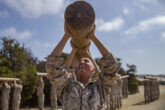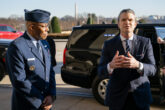June 11, 2020
Called to Lead
Discovering the Connections Between Military Service and Higher Education Leadership
Introduction and Executive Summary
America has a long-standing commitment to funding post-secondary education for service members, many of whom would otherwise have delayed enrollment or deemed the opportunity of a higher education unaffordable altogether. The commitment began in earnest in 1944 through the Servicemen’s Readjustment Act, which provided federal benefits to veterans to defray the cost of unemployment, education, and purchasing a home. This landmark legislation established the GI Bill, led to a historic increase of veterans pursuing a degree, and effectively democratized higher education. America’s promise to service members and veterans in higher education remains vibrant through the 2017 Forever GI Bill, which made education benefits for military-connected students available for life. Nearly eight decades later, the GI Bill continues to pay dividends. Student veterans in college campuses across the country engage as some of the best-performing nontraditional students compared to other adult learners.1
Simultaneous to the GI Bill’s evolution, higher education also evolved with a distinct set of challenges in the 21st century, including a changing demography of prospective students, increasing out-of-pocket costs and decreasing state support, and growing skepticism on the value of a post-secondary degree. Service members and veterans who earned a degree though the GI Bill, or by other means, will choose to enter higher education as a career and continue to serve an important role leading, teaching, and mentoring the next generation of Americans. This report examines the connection between military service and veterans who work in higher education, and how they navigate profound change in the higher education landscape. The report also provides recommendations to explicitly target the recruitment of veterans into higher education leadership roles and support their careers.
Higher education in America is at an inflection point. The rapidly changing demography of its prospective students, persistent increases in the out-of-pocket costs for an increasingly low- to middle-income student demographic, growing skepticism of the value of post-secondary attainment, and the compounding student debt owed by Americans place increasing pressure on the seams of our nation’s post-secondary educational infrastructure. The country must continue to address these challenges with a sense of urgency, and we must continue exploring new ways to approach solutions to these challenges. Developing a critical mass of adaptive leaders across organizations is critical to higher education’s success now and for generations to come.
While military service provides a critical avenue for the development of skills and competencies required for success in higher education leadership, there is (1) an inadequate understanding by many in higher education, as in the general public, about the virtues of military service in forging the knowledge and skill profile required for higher education leadership roles; and (2) a gap in the literature and corresponding policy recommendations about pathways for service members and veterans into executive-level higher education leadership roles. Therefore, the purposes of this study are (1) to identify the connections between military service and higher education leadership competencies; and (2) offer recommendations for growing the number of service members and veterans who are positioned to assume leadership roles in higher education settings.
Using a semi-structured qualitative interview design of currently serving higher education leaders and practitioners with prior military service, this paper identifies the reasons why veterans choose to work in higher education, captures the leadership skills and traits learned in the military that practically apply to their roles, identifies current challenges in higher education’s mission to serve students, and provides recommendations for recruiting more veterans into leadership roles. Among this paper’s most significant findings are:
- Veterans choose to work in higher education as an extension of their military service because of overlapping values, traditions, and progressive leadership opportunity. Budget management, empowering teams toward mission attainment, and being adaptable in the midst of constant change and uncertainty are broad skill categories gained through military service and applied in higher education that have fostered an unquestionable desire by veterans to continue what began when they joined the All-Volunteer Force.
- Veterans who work in higher education have leadership tools gained through military service at their disposal, including, among others: mission focus, strategic thinking, adaptability, resiliency, comfort with ambiguity and leading change, experience working with individuals from diverse backgrounds, and personnel and budget management experience.
- The leadership tools identified above will help veterans navigate our system of higher education as a corps of adaptive leaders ready and willing to confront profound challenges that, when asked, they identified as:
- Higher education’s slow pace of change relative to the changing needs and characteristics of today’s students
- Decreasing perception in the value of a post-secondary degree
- Decreasing enrollment
- Aging infrastructure and unsustainable cost to the student
- The lack of focus on the intersection of diversity, equity, and inclusion by campus leaders, and competing spheres of influence on campus.
- Solutions to the key challenges confronting higher education can be supported, in part, through a critical mass of adaptive leaders, and military service provides fertile ground for the development of adaptive leadership skills.
- Through intentional academic programming, recruitment efforts, and partnerships, the higher education, nonprofit, and government sectors can help veterans view higher education not only as a waypoint for separating service members, but also as a viable career opportunity.
Download the full working paper.
- “I am Post-9/11 Student Veteran,” Institute of Veterans and Military Families/Student Veterans of America, June 2017, 3, https://ivmf.syracuse.edu/wp-content/uploads/2017/06/I-AM-A-POST-911-Student-Veteran-REPORT.pdf. ↩
More from CNAS
-
National Security Human Capital Program
Defending the Army’s Command Assessment ProgramThe concept for CAP — developed during the first Trump administration — benefited from the guidance, input and oversight from the foremost scholar and practitioner on military...
By Katherine L. Kuzminski
-
National Security Human Capital Program
‘Women Don’t Just Achieve…They Excel’: Fmr. Marine Corps Attack PilotDr. Kyleanne Hunter, former Marine Corps attack pilot and CEO of Iraq & Afghanistan Veterans of America, says “women are the fastest growing group of veterans” and “the fastes...
By Dr. Kyleanne Hunter
-
National Security Human Capital Program
Could the U.S. Bring Back the Draft?In this episode of At the Boundary, GNSI’s Dr. Guido Rossi sits down with Katherine Kuzminski, Director of Studies at the Center for a New American Security (CNAS), to explore...
By Katherine L. Kuzminski
-
National Security Human Capital Program
Hegseth Brings the Culture War to CombatThe fundamental challenge of military leadership lies in creating cohesive teams that can work together in an environment of mortal risk and, when called upon to do so, use le...
By Dr. Jason Dempsey






